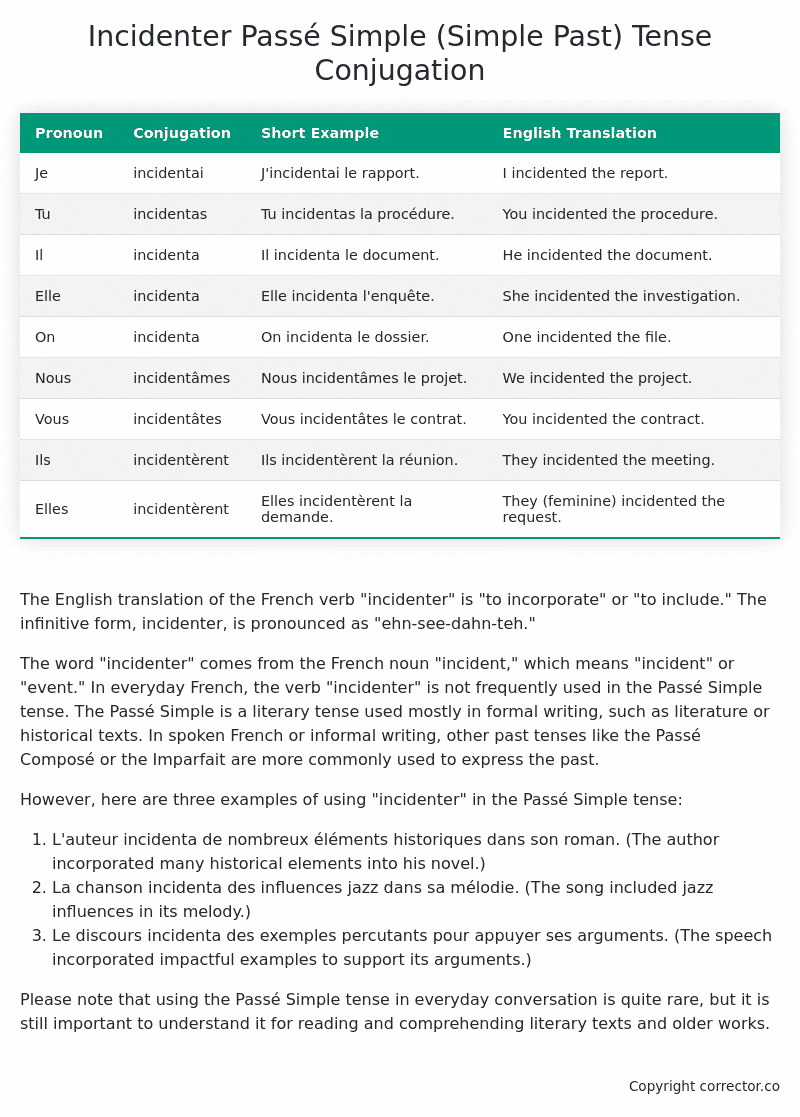Passé Simple (Simple Past) Tense Conjugation of the French Verb incidenter
Introduction to the verb incidenter
The English translation of the French verb “incidenter” is “to incorporate” or “to include.” The infinitive form, incidenter, is pronounced as “ehn-see-dahn-teh.”
The word “incidenter” comes from the French noun “incident,” which means “incident” or “event.” In everyday French, the verb “incidenter” is not frequently used in the Passé Simple tense. The Passé Simple is a literary tense used mostly in formal writing, such as literature or historical texts. In spoken French or informal writing, other past tenses like the Passé Composé or the Imparfait are more commonly used to express the past.
However, here are three examples of using “incidenter” in the Passé Simple tense:
- L’auteur incidenta de nombreux éléments historiques dans son roman. (The author incorporated many historical elements into his novel.)
- La chanson incidenta des influences jazz dans sa mélodie. (The song included jazz influences in its melody.)
- Le discours incidenta des exemples percutants pour appuyer ses arguments. (The speech incorporated impactful examples to support its arguments.)
Please note that using the Passé Simple tense in everyday conversation is quite rare, but it is still important to understand it for reading and comprehending literary texts and older works.
Table of the Passé Simple (Simple Past) Tense Conjugation of incidenter
| Pronoun | Conjugation | Short Example | English Translation |
|---|---|---|---|
| Je | incidentai | J’incidentai le rapport. | I incidented the report. |
| Tu | incidentas | Tu incidentas la procédure. | You incidented the procedure. |
| Il | incidenta | Il incidenta le document. | He incidented the document. |
| Elle | incidenta | Elle incidenta l’enquête. | She incidented the investigation. |
| On | incidenta | On incidenta le dossier. | One incidented the file. |
| Nous | incidentâmes | Nous incidentâmes le projet. | We incidented the project. |
| Vous | incidentâtes | Vous incidentâtes le contrat. | You incidented the contract. |
| Ils | incidentèrent | Ils incidentèrent la réunion. | They incidented the meeting. |
| Elles | incidentèrent | Elles incidentèrent la demande. | They (feminine) incidented the request. |
Other Conjugations for Incidenter.
Le Present (Present Tense) Conjugation of the French Verb incidenter
Imparfait (Imperfect) Tense Conjugation of the French Verb incidenter
Passé Simple (Simple Past) Tense Conjugation of the French Verb incidenter (You’re reading it right now!)
Passé Composé (Present Perfect) Tense Conjugation of the French Verb incidenter
Futur Simple (Simple Future) Tense Conjugation of the French Verb incidenter
Futur Proche (Near Future) Tense Conjugation of the French Verb incidenter
Plus-que-parfait (Pluperfect) Tense Conjugation of the French Verb incidenter
Passé Antérieur (Past Anterior) Tense Conjugation of the French Verb incidenter
Futur Antérieur (Future Anterior) Tense Conjugation of the French Verb incidenter
Subjonctif Présent (Subjunctive Present) Tense Conjugation of the French Verb incidenter
Subjonctif Passé (Subjunctive Past) Tense Conjugation of the French Verb incidenter
Subjonctif Imparfait (Subjunctive Imperfect) Tense Conjugation of the French Verb incidenter
Subjonctif Plus-que-parfait (Subjunctive Pluperfect) Tense Conjugation of the French Verb incidenter
Conditionnel Présent (Conditional Present) Tense Conjugation of the French Verb incidenter
Conditionnel Passé (Conditional Past) Tense Conjugation of the French Verb incidenter
Conditionnel Passé II (Conditional Past II) Tense Conjugation of the French Verb incidenter
L’impératif Présent (Imperative Present) Tense Conjugation of the French Verb incidenter
L’impératif Passé (Imperative Past) Tense Conjugation of the French Verb incidenter
L’infinitif Présent (Infinitive Present) Tense Conjugation of the French Verb incidenter
L’infinitif Passé (Infinitive Past) Tense Conjugation of the French Verb incidenter
Le Participe Présent (Present Participle) Tense Conjugation of the French Verb incidenter
Le Participe Passé (Past Participle) Tense Conjugation of the French Verb incidenter
Struggling with French verbs or the language in general? Why not use our free French Grammar Checker – no registration required!
Get a FREE Download Study Sheet of this Conjugation 🔥
Simply right click the image below, click “save image” and get your free reference for the incidenter Passé Simple tense conjugation!

Incidenter – About the French Passé Simple (Simple Past) Tense
Formation
Usage
Narration
Historical Context
Interactions with other tenses
Passé Composé
Imparfait
Conditional and Subjunctive
Summary
I hope you enjoyed this article on the verb incidenter. Still in a learning mood? Check out another TOTALLY random French verb conjugation!


